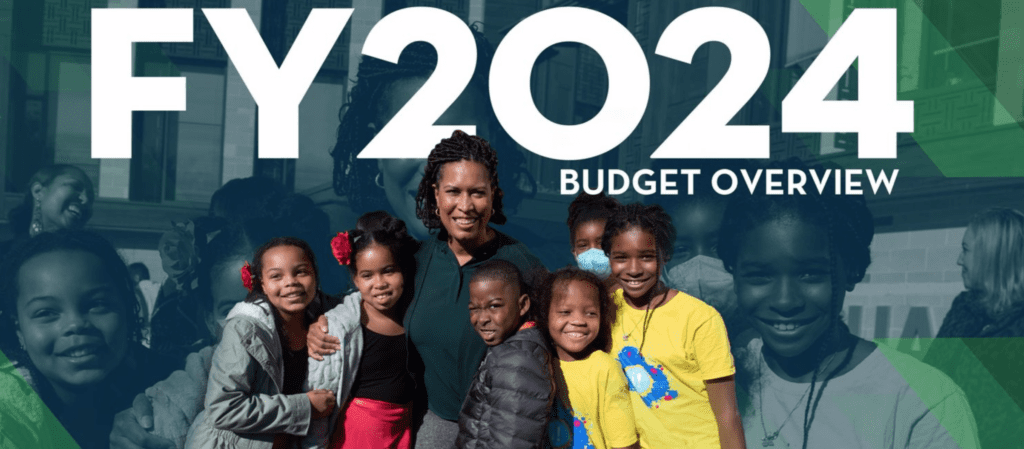Mayor’s Reduced D.C. Budget Difficult to Label
By • March 23, 2023 0 1886

“Scant,” “Fair Shot,” “Comeback”?
District spokespeople, analysts and journalists are struggling with how to describe the new budget for Washington, D.C., that Mayor Muriel Bowser presented in her final $19.7 billion, 2023 budget to the D.C. Council during a four-hour meeting and press conference on March 22 at the Martin Luther King Memorial Library.
An estimated $1.7 billion deficit or budget gap in revenue projected late in 2022 after much more optimistic revenue sums dominated the town hall meetings and reduced Mayor Bowser’s wish-list of proposals significantly.
Council Chair Phil Mendelsen criticized the new budget as being the result of “poor choices.”
“Although next year’s budget will have more money to spend than this year’s, and the Mayor has chosen the theme of recovery, a closer look reveals budget choices that set back recovery for low-income and middle-income residents,” Mendelsen wrote.
He listed particularly the following cuts: Emergency Rental Assistance Program (ERAP) from $43 million to $8 million, despite current demand; 60 percent reduction in Civil Legal Services, which primarily helps tenants with eviction; the elimination of 22 building inspectors, which he said will set back efforts to curb slumlord conditions for tenants; and the elimination of the free bus service for everyone originating a trip in the District – a benefit the Council maintains it will continue to advocate for despite the mayor’s lack of current support for the measure.
“This budget reflects many tough choices, but we’re also fortunate that even in tight times, the District remains well-resourced and able to continue delivering world-class programs and services,” said Mayor Bowser. “As I’ve said before, when we work together, there’s nothing that we cannot take on. The FY 2024 Budget makes the necessary investments to promote and sustain the District’s comeback by unlocking the full potential of our residents, our neighborhoods, and our businesses.”
And, of course, $1.9 billion still can cover a lot of city operations, obligations and even some new programs.
A long list of funded programs and new investments – available on the mayor’s web page – lists significant budgeted expenditures to support businesses education, recreation, public safety, public housing, building a strong municipal police department, health and human services and government services.
For instance, in education, the mayor pointed out in particular the My Afterschool DC program meant to be free for families. Some new investments in health and human services include: $900,000 to buy down $90 million of medical debt for approximately 90,000 residents; $42 million to support rental assistance through the Family Re-Housing Stabilization Program; $24.4 million to provide increased Medicaid rates for services in the behavioral health sector; $2.2 million to support homeless prevention programming and outreach; $1.7 million to support housing case management services for behavioral health service clients; $1 million to increase the eligibility for the Safe at Home program; $744,600 to increase personal needs allowance for individuals with disabilities; $550,000 to provide free dental services for seniors; and $340,500 to distribute tablet devices to seniors for improving wellness activities, telehealth and socialization.
Bowser told Council members that the city’s finances are strong, but they must face the estimated drop in revenue – that’s ranged between $90 million and $490 million and more in different reports – that’s being blamed by city officials as due to the current economic slump, expiring federal pandemic funds and the fact that downtown workers preference for telework is keeping downtown office buildings and the adjacent businesses (from dry cleaning to coffee hangouts) empty.
“Last month’s revenue estimates were a sobering reminder of how urgent the work is to bring back our downtown,” Bowser said. She has proposed that the federal government give back to the city many now almost empty office buildings so that the city can convert them into apartments. The mayor has proposed a goal of one new resident for every ten workers not returning.
Bowser’s budget also proposes abolishing the Criminal Code Reform committee that proposed the controversial loosening of sentencing and policing practices that the mayor vetoed last February, the D.C. Council overrode and Congress and the U.S., Senate essentially repealed by large bipartisan votes on a Constitutional-based process called a “resolution of disapproval.”
A final vote on the new city budget by the Council – expect changes and negotiations – is expected by May 20.

